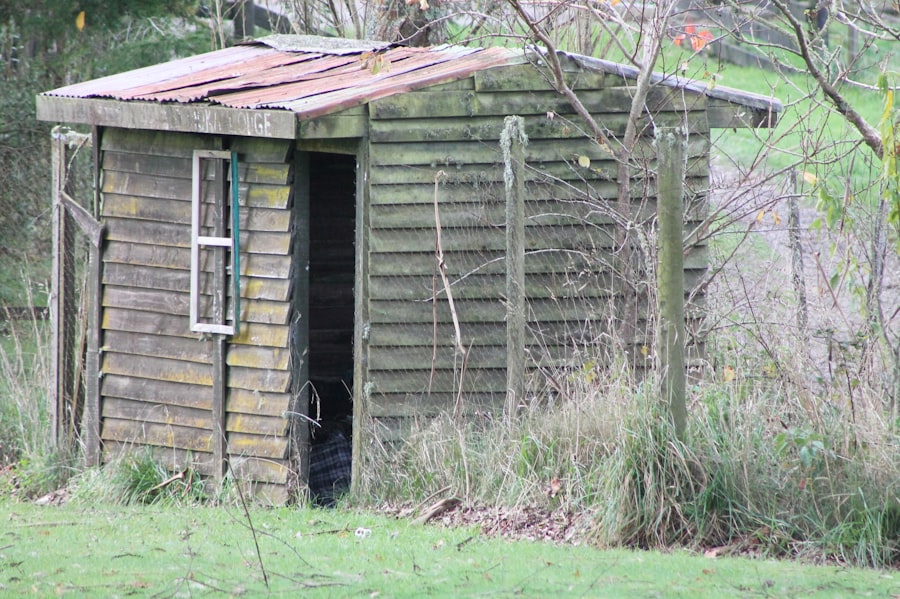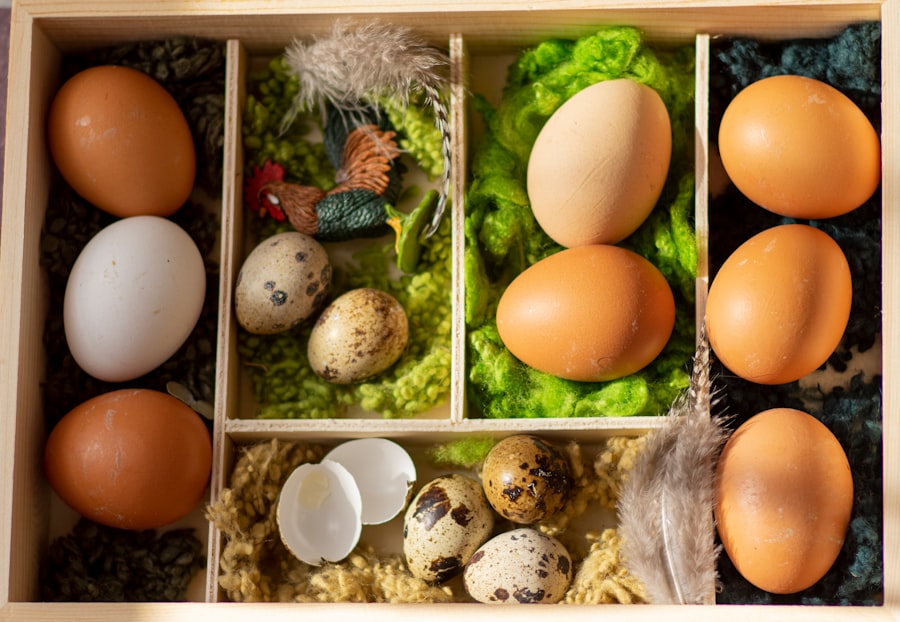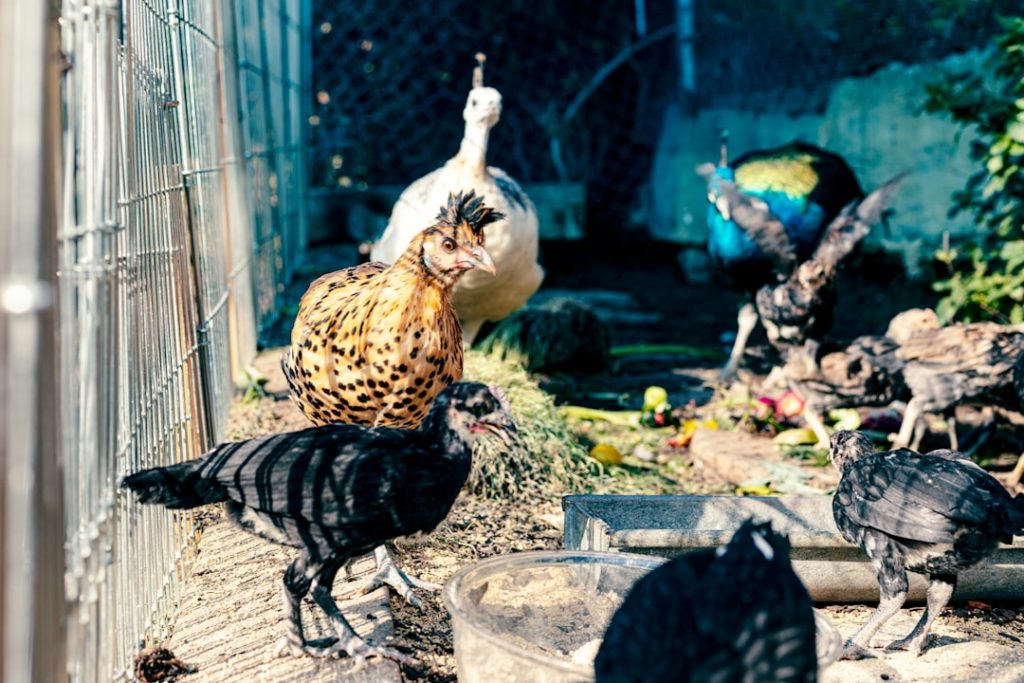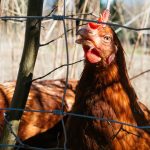Understanding the predators that pose a threat to your coop is crucial for protecting your chickens. Common predators include foxes, raccoons, coyotes, weasels, snakes, and birds of prey. Each predator has its own unique hunting techniques and behaviors, which chicken owners should be aware of to effectively protect their flock.
Foxes are known for their cunning and agility, often able to dig under or climb over fencing to access a coop. Raccoons are notorious for their dexterity and ability to manipulate latches and locks. Coyotes are skilled hunters and can easily jump over low fences.
Weasels are small and agile, able to squeeze through small openings in the coop. Snakes can slither through small gaps and are a threat to both eggs and chicks. Birds of prey, such as hawks and owls, pose a threat from the air and can swoop down to snatch chickens.
By understanding the behaviors and capabilities of these predators, chicken owners can better prepare their coops for potential attacks. This knowledge helps in implementing necessary security measures to keep the flock safe from harm. Proper coop design, secure fencing, and vigilant monitoring are essential components of effective predator protection for chickens.
Table of Contents
Key Takeaways
- Predators can include a variety of animals such as raccoons, foxes, and birds of prey, so it’s important to understand their behavior and habits.
- Securing the coop with strong materials and adding locks to doors and windows can help prevent predators from gaining access to the chickens.
- Proper fencing should be installed around the coop and run area to keep predators out, and it should be buried underground to prevent digging.
- Predator-proof latches should be used on all doors and windows to ensure that predators cannot manipulate them to gain entry.
- Adequate lighting around the coop can help deter nocturnal predators and make it easier to spot any potential threats.
Securing the Coop
Inspect and Repair the Coop
Start by inspecting the coop for any weak spots or vulnerabilities that could be exploited by predators. Repair any holes or gaps in the walls or roof that could allow access to predators.
Reinforce the Coop with Sturdy Materials
Use sturdy materials such as hardware cloth or welded wire to reinforce weak areas and prevent predators from gaining entry. In addition to reinforcing the physical structure of the coop, it’s important to secure all openings with predator-proof latches. This includes doors, windows, and vents.
Maintain Predator-Proof Latches and Keep the Coop Clean
Predator-proof latches are designed to be difficult for predators to manipulate, preventing them from gaining access to the coop. Regularly inspect and maintain these latches to ensure they remain effective in keeping predators out. Another important aspect of securing the coop is keeping it clean and free of food scraps that could attract predators. Store feed in secure containers that are inaccessible to pests, and regularly clean up any spilled food or debris around the coop. By eliminating potential food sources, you can reduce the likelihood of attracting predators to your coop.
Installing Proper Fencing

Installing proper fencing is crucial for keeping predators out of your chicken coop. Choose a sturdy fencing material such as hardware cloth or welded wire that is difficult for predators to chew through or break. The fencing should be buried at least 12 inches into the ground to prevent digging predators from gaining access under the fence.
Ensure that the fencing is tall enough to prevent predators from jumping over it. A height of at least 6 feet is recommended for keeping out most predators, but taller fencing may be necessary in areas with larger or more agile predators such as coyotes. Regularly inspect the fencing for any signs of damage or wear, and promptly repair any issues to maintain its effectiveness in keeping predators out.
Additionally, consider adding an apron of fencing that extends outward from the base of the coop to further deter digging predators. Installing proper fencing is crucial for keeping predators out of your chicken coop. Choose a sturdy fencing material such as hardware cloth or welded wire that is difficult for predators to chew through or break.
The fencing should be buried at least 12 inches into the ground to prevent digging predators from gaining access under the fence. Ensure that the fencing is tall enough to prevent predators from jumping over it. A height of at least 6 feet is recommended for keeping out most predators, but taller fencing may be necessary in areas with larger or more agile predators such as coyotes.
Regularly inspect the fencing for any signs of damage or wear, and promptly repair any issues to maintain its effectiveness in keeping predators out. Additionally, consider adding an apron of fencing that extends outward from the base of the coop to further deter digging predators.
Using Predator-Proof Latches
Using predator-proof latches on all openings of the coop is essential for preventing predators from gaining access to your flock. These latches are designed to be difficult for predators to manipulate, ensuring that doors, windows, and vents remain securely closed. Choose latches that are specifically designed to be predator-proof, such as those with locking mechanisms that require dexterity or strength to open.
Regularly inspect these latches for any signs of wear or damage, and promptly replace any that are no longer effective in securing the coop. In addition to using predator-proof latches, consider adding locks or additional security measures to further deter predators from attempting to access the coop. By making it as difficult as possible for predators to open doors or windows, you can greatly reduce the risk of a predator attack on your flock.
Using predator-proof latches on all openings of the coop is essential for preventing predators from gaining access to your flock. These latches are designed to be difficult for predators to manipulate, ensuring that doors, windows, and vents remain securely closed. Choose latches that are specifically designed to be predator-proof, such as those with locking mechanisms that require dexterity or strength to open.
Regularly inspect these latches for any signs of wear or damage, and promptly replace any that are no longer effective in securing the coop. In addition to using predator-proof latches, consider adding locks or additional security measures to further deter predators from attempting to access the coop. By making it as difficult as possible for predators to open doors or windows, you can greatly reduce the risk of a predator attack on your flock.
Providing Adequate Lighting
Providing adequate lighting around the coop can help deter nocturnal predators such as raccoons and owls. Install motion-activated lights around the perimeter of the coop that will turn on when they detect movement, startling potential predators and making them think twice about approaching the coop. In addition to motion-activated lights, consider keeping a light on inside the coop during nighttime hours.
This can help deter nocturnal predators by making it more difficult for them to approach undetected. Regularly check and maintain the lighting around the coop to ensure that it remains effective in deterring potential predators. Replace any burnt-out bulbs promptly and keep an eye out for any signs of damage or wear on the light fixtures.
Providing adequate lighting around the coop can help deter nocturnal predators such as raccoons and owls. Install motion-activated lights around the perimeter of the coop that will turn on when they detect movement, startling potential predators and making them think twice about approaching the coop. In addition to motion-activated lights, consider keeping a light on inside the coop during nighttime hours.
This can help deter nocturnal predators by making it more difficult for them to approach undetected. Regularly check and maintain the lighting around the coop to ensure that it remains effective in deterring potential predators. Replace any burnt-out bulbs promptly and keep an eye out for any signs of damage or wear on the light fixtures.
Using Guard Animals

Benefits of Guard Animals
Guard animals such as dogs or geese can provide an additional layer of protection for your flock against potential predators. Dogs are natural protectors and can be trained to patrol the perimeter of the coop and deter any potential threats. Geese are also known for their protective instincts and loud honking, which can alert you to potential danger and scare off predators.
Selecting and Introducing Guard Animals
When selecting a guard animal, choose one that is well-suited for protecting chickens and has been properly trained for this purpose. Introduce guard animals to your flock gradually and monitor their interactions closely to ensure they do not pose a threat to your chickens themselves.
Caring for Guard Animals
Regularly check on your guard animals and provide them with proper care and attention so they remain effective in protecting your flock from potential predators. This includes ensuring they receive adequate food, water, and shelter, as well as providing regular veterinary care and training to maintain their protective instincts.
Implementing Regular Checks and Maintenance
Implementing regular checks and maintenance of your coop’s security measures is essential for ensuring their effectiveness in protecting your flock from predators. Schedule regular inspections of the coop’s physical structure, including walls, roof, doors, windows, vents, and fencing. Inspect predator-proof latches regularly for any signs of wear or damage, replacing them as needed to maintain their effectiveness in securing the coop’s openings.
Check lighting fixtures regularly for burnt-out bulbs or signs of damage, replacing them promptly as needed. Monitor guard animals closely and provide them with proper care and attention so they remain effective in protecting your flock from potential predators. Implementing regular checks and maintenance of your coop’s security measures is essential for ensuring their effectiveness in protecting your flock from predators.
Schedule regular inspections of the coop’s physical structure, including walls, roof, doors, windows, vents, and fencing. Inspect predator-proof latches regularly for any signs of wear or damage, replacing them as needed to maintain their effectiveness in securing the coop’s openings. Check lighting fixtures regularly for burnt-out bulbs or signs of damage, replacing them promptly as needed.
Monitor guard animals closely and provide them with proper care and attention so they remain effective in protecting your flock from potential predators. In conclusion, understanding the behaviors and capabilities of common chicken predators is crucial for implementing effective security measures in your chicken coop. Securing the physical structure of the coop with proper fencing, predator-proof latches, adequate lighting, and guard animals is essential for protecting your flock from potential threats.
Implementing regular checks and maintenance of these security measures will ensure their continued effectiveness in safeguarding your chickens from harm. By taking these proactive steps, you can create a safe and secure environment for your flock to thrive in peace.
If you’re looking for creative ways to keep your chickens safe from predators, you might want to consider turning a shed into a chicken coop. This article from Poultry Wizard provides a step-by-step guide on how to repurpose a shed into a secure and comfortable home for your feathered friends. Check it out here for some valuable tips and ideas.
FAQs
What are common predators of chickens?
Common predators of chickens include foxes, raccoons, coyotes, hawks, owls, snakes, and domestic dogs.
How can I protect my chickens from predators?
You can protect your chickens from predators by securing their coop with sturdy fencing, using predator-proof latches on doors, installing motion-activated lights or alarms, and keeping the area around the coop free of tall grass and brush.
Are there any natural deterrents for predators?
Some natural deterrents for predators include using guard animals such as dogs or llamas, and planting thorny bushes or shrubs around the coop to discourage predators from approaching.
What should I do if I suspect a predator is targeting my chickens?
If you suspect a predator is targeting your chickens, it’s important to take immediate action to secure the coop and remove any potential threats. You may also want to consider setting up traps or contacting a professional wildlife removal service.
Are there any specific precautions to take at night?
At night, it’s important to securely lock the coop and ensure that all windows and doors are closed to prevent predators from gaining access. You may also want to consider using motion-activated lights or alarms to deter nocturnal predators.
Meet Walter, the feathered-friend fanatic of Florida! Nestled in the sunshine state, Walter struts through life with his feathered companions, clucking his way to happiness. With a coop that’s fancier than a five-star hotel, he’s the Don Juan of the chicken world. When he’s not teaching his hens to do the cha-cha, you’ll find him in a heated debate with his prized rooster, Sir Clucks-a-Lot. Walter’s poultry passion is no yolk; he’s the sunny-side-up guy you never knew you needed in your flock of friends!







